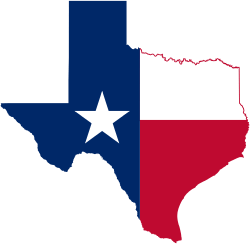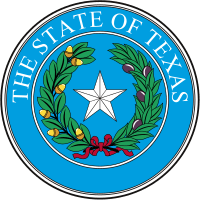Micajah Autry
Micajah Autry (1793 – March 6, 1836) was an American merchant, poet and lawyer who died in the Texas Revolution at the Battle of the Alamo.
Part of a series on the |
||||||||||||||||||
|---|---|---|---|---|---|---|---|---|---|---|---|---|---|---|---|---|---|---|
| History of Texas | ||||||||||||||||||
 | ||||||||||||||||||
| Timeline | ||||||||||||||||||
|
||||||||||||||||||
|
| ||||||||||||||||||
Biography
Autry was born, 1793 of a Quaker family,[1] in Sampson County, North Carolina, to Theophilus and Elizabeth (Crumpler) Autry. Between the ages of 17 and 18, he volunteered for military service against the British in the War of 1812. He marched to Wilmington, North Carolina, as a member of a volunteer militia company and later joined the United States Army at Charleston, South Carolina. He remained in Charleston in the company of Captain Long until the Treaty of Ghent was signed in 1815.[2] After the war, bad health forced Autry to quit farming and become a teacher. Then in 1823, he moved to Haysboro in Davidson County, Tennessee, and studied law. At the end of that year, he married a widow, Martha Wyche Putney Wilkinson. They had two children of their own who survived to adulthood; and they raised Martha's daughter from her first marriage. In 1828, Autry was admitted to the bar in Nashville. He practiced law in Jackson, Tennessee, between 1831 and 1835, in a partnership with Andrew L. Martin. Autry and Martin later started an unsuccessful mercantile business in Nashville.[2]
During a subsequent business trip to New York City and Philadelphia, he heard of the opportunities in Texas. In 1835 he left his family and slaves in the care of Samuel Smith, his stepdaughter's husband, and set out for Texas by steamboat from Nashville.
From Natchitoches, Louisiana, on December 13 he wrote: "About 20 men from Tennessee formed our squad.... [T]he war [in Texas] is still going on favorably to the Texans, but it is thought that Santa Anna will make a descent with his whole force in the Spring, but there will be soldiers enough of the real grit in Texas by that time to overrun all of Mexico.... We have between 400 and 500 miles to foot it to the seat of government, for we cannot get horses, but we have sworn allegiance to each other and will get along somehow."[3]
He was in Nacogdoches, Texas, on January 13, 1836, where he enlisted in the Volunteer Auxiliary Corps of Texas. His letter to his wife written on that date indicated that he had set out for Washington-on-the-Brazos with David Crockett and others under the command of Capt. William B. Harrison. He arrived in San Antonio de Bexar with this company on February 9 and joined the Alamo garrison under the command of Lt. Col. William Barrett Travis.
After a siege lasting 13 days, Autry was killed with the rest of the Alamo garrison after the Mexican army stormed it on March 6, 1836. Among some of his possessions now housed at the Alamo in San Antonio, Texas, is an eagle approximately 3 feet high which he carved. They also have a collection of his letters and poetry written to his beloved wife.
References
- Photo of his monument in Mississippi cemetery
- "Autry, Micajah", by Bill Groneman, uploaded August 7, 2010, in the Handbook of Texas Online. Accessed 08 December, 2015.
- Wallace O. Chariton, 100 Days in Texas: The Alamo Letters, pg. 31.
Sources
- "Micajah Autry, A Soldier of the Alamo," Adele B. Looscan, Southwestern Historical Quarterly, April 1911.
- James Lockhart Autry Papers, Woodson Research Center, Fondren Library, Rice University, Houston, Texas.
- 100 Days in Texas: The Alamo Letters, Wallace O. Chariton, Plano, Texas: Wordware Publishing, Inc., 1989.
External links
- Micajah Autry in the Handbook of Texas Online
- Autry heritage website
- Micajah Autry's Alamo memorial at Find a Grave
- Micajah Autry's monument at Hillcrest Cemetery in northern Mississippi, also on Find a Grave
